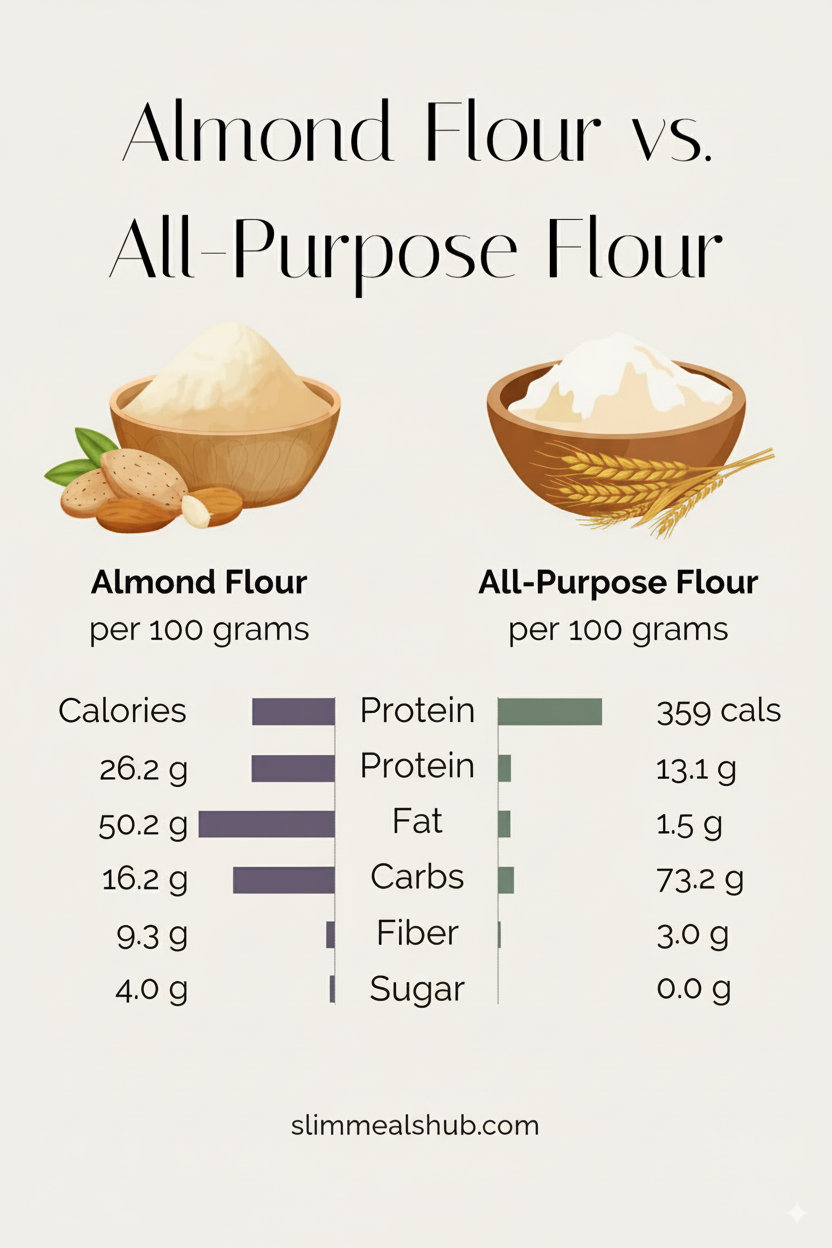When it comes to baking and cooking, flour is one of the most essential ingredients in almost every kitchen. For decades, all-purpose flour has been the most common choice, but with the rise of low-carb, gluten-free, and keto diets, almond flour has become a popular alternative. Many health-conscious people now wonder: is almond flour really healthier than all-purpose flour? To answer this question, let’s break down the nutritional profiles, health benefits, and potential drawbacks of both.
Table of Contents

What is Almond Flour?
Almond flour is made from blanched almonds that are ground into a fine powder. Unlike almond meal, which includes the skins and has a coarser texture, almond flour is light, fluffy, and ideal for gluten-free baking. Because it’s made entirely from nuts, almond flour naturally contains protein, healthy fats, vitamins, and minerals. It’s commonly used in keto recipes, paleo diets, and gluten-free baked goods.
What is All-Purpose Flour?
All-purpose flour, also called refined white flour, is made by processing wheat grains to remove the bran and germ, leaving only the starchy endosperm. This makes the flour smooth, versatile, and perfect for everything from bread and cakes to cookies and pasta. However, this refinement process strips away much of the fiber and nutrients. While some versions are “enriched” with vitamins and minerals, all-purpose flour is mostly carbohydrates with very little fat or protein.
Nutritional Comparison: Almond Flour vs. All-Purpose Flour
Let’s look at the nutrient breakdown per 100 grams (values are approximate). Almond Flour (100g): Calories ~600, Carbohydrates ~20g, Fiber ~10g, Protein ~21g, Fat ~50g (mostly healthy monounsaturated fats), Vitamins & Minerals: High in Vitamin E, magnesium, calcium, iron, potassium. All-Purpose Flour (100g): Calories ~364, Carbohydrates ~76g, Fiber ~3g, Protein ~10g, Fat ~1g, Vitamins & Minerals: Enriched with iron and B vitamins but low in natural micronutrients. Clearly, almond flour is higher in calories and fat, but the fat is mostly heart-healthy. It also provides more protein and fiber, while all-purpose flour is mainly starch and empty calories.
Health Benefits of Almond Flour
Almond flour is gluten-free, making it perfect for people with celiac disease or gluten sensitivity. It is low in carbs and keto-friendly, with fewer net carbs that fit low-carb diets. Its high content of monounsaturated fats supports cardiovascular health. Being rich in Vitamin E (an antioxidant), magnesium (good for blood pressure), and calcium (important for bones), it delivers solid nutritional value. Moreover, its high protein and fat content helps you feel full for longer, reducing overeating.
Also Read : Sweet Potato and Sausage Frittata – A Wholesome, Protein-Rich Meal
Health Concerns with Almond Flour
Despite its benefits, almond flour has drawbacks. It is calorie-dense, so portion control is essential for weight management. It is more expensive than regular flour and may not be accessible to everyone. People with nut allergies must avoid it. Its texture differs from wheat flour, so it may not always mimic the structure of gluten-containing flours in baking.
Health Benefits of All-Purpose Flour
All-purpose flour is extremely versatile and affordable, making it a staple in kitchens worldwide. It works for breads, cakes, cookies, and pasta, delivering consistent results. Since it’s often enriched with iron and B vitamins, it contributes to daily nutrient intake. Its light texture and gluten content help create the structure and chewiness of baked goods that almond flour cannot fully replicate. It also has a lower calorie density than almond flour, which means it can be easier to manage calorie intake if portion sizes are controlled.
Health Concerns with All-Purpose Flour
The biggest drawback of all-purpose flour is that it is highly refined. The removal of bran and germ strips away most fiber, vitamins, and minerals, leaving behind mostly starch. Its high glycemic index means it spikes blood sugar quickly, making it less suitable for people with diabetes or insulin resistance. Overconsumption of refined flour has been linked to weight gain, inflammation, and higher risk of chronic diseases. It is also not suitable for people with gluten intolerance or celiac disease.
Almond Flour vs. All-Purpose Flour in Baking
When it comes to baking, both flours behave very differently. Almond flour creates denser, moister baked goods with a slightly nutty flavor. It doesn’t rise the same way as wheat flour because it lacks gluten, which gives bread and cakes their structure. On the other hand, all-purpose flour creates light, airy textures and chewy bread thanks to gluten development. Recipes often cannot be swapped 1:1; almond flour usually requires extra eggs or binders to hold recipes together, while all-purpose flour can stand alone. Bakers often find success mixing almond flour with other gluten-free flours or using it in recipes specifically designed for it.
Which is Better for Weight Loss?
If weight loss is your goal, both flours have pros and cons. Almond flour is nutrient-dense and filling, which can help you stay satisfied and reduce snacking. However, it is high in calories, so portion control is key. All-purpose flour is lower in calories per gram but less filling and more likely to cause blood sugar spikes, which may lead to cravings. Overall, almond flour supports long-term satiety and nutrient balance, but mindful portions are critical.
Which is Better for Overall Health?
For general health, almond flour offers more nutrients, fiber, and healthy fats. It supports heart health, blood sugar balance, and provides essential vitamins. All-purpose flour, while versatile, is less nutrient-dense and often considered an “empty calorie” food. Still, it can be part of a balanced diet if consumed in moderation and paired with nutrient-rich foods. For people without gluten sensitivity who enjoy occasional baking, all-purpose flour is not inherently bad but should not dominate the diet.
FAQs
Can I replace all-purpose flour with almond flour in all recipes?
No, almond flour cannot replace all-purpose flour 1:1 because it lacks gluten. It works better in recipes designed specifically for almond flour or with adjustments such as adding extra eggs.
Is almond flour keto-friendly?
Yes, almond flour is one of the most popular keto flours because it is low in carbs and high in fat and protein.
Is almond flour safe for diabetics?
Almond flour is a better choice for diabetics because it has a lower glycemic index and doesn’t spike blood sugar the way all-purpose flour does.
Which flour is more affordable?
All-purpose flour is much cheaper and widely available, while almond flour is expensive and sometimes harder to find.
Can I combine both flours?
Yes, some recipes mix almond flour and all-purpose flour to get the benefits of both texture and flavor. However, this is not suitable for people with gluten intolerance.

